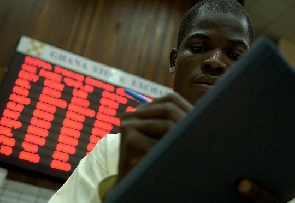 The Ghana Stock Exchange (GSE) is a trading plaform for listed companies
The Ghana Stock Exchange (GSE) is a trading plaform for listed companies
Uncertainties arising from the impending Domestic Debt Exchange Programme (DDEP), coupled with rising interest rates and foreign exchange fluctuations, will take a toll on the equities market say analysts.
“The situation has not only affected investor confidence in the financial sector but is also likely to have a negative impact on the stock market. Investors are looking to redeem their funds and expecting the coupons from their bond investments; but with government propositions, they are not getting the expected returns. This means that diversification will be a problem, and the stock market may be affected as some will look for long-term investments,” Augustine Baidoo, a management consultant and investment banker, told the B&FT.
He explained that introduction of the DDEP and the current economic climate have made investing uncertain for investors, leaving them with limited options for diversification. He added that investors are therefore looking forward to a conclusive agreement or arrangement with government in order to make informed investment decisions.
Similarly, SEM Capital – in its review of fourth quarter 2022 and outlook for 2023 – stated the market is unlikely to recover fully this year due to the aforementioned factors.
“Looking ahead, experts expect further tightening of the Monetary Policy rate and interest rates to inch upward due to inflationary pressures. On the capital market, returns of the GSE Composite and GSE Financial Stock Index are likely to decline further due to government’s pending Domestic Debt Exchange Programme – which will have a negative impact on interest income and profits of the listed banks, as their assets are mostly Government of Ghana securities,” it said in a note.
With the ongoing uncertainty surrounding the DDEP, along with the not-too-positive outlook for key macroeconomic indicators, they said investor confidence will take a hit; making it unlikely for the market to recover fully this year.
Stating that it anticipates further pressure on the local currency, SEM noted that this will have an adverse bearing on manufacturing companies as the cost of importing raw materials will increase, leading to lower production and higher prices for finished products.
The Managing Director of Sentinel Asset Management, Kisseih Antonio, meanwhile noted that despite the setback to investor confidence and potential material losses, the current state of the market should lead to improved communication around investments.
“Hopefully, as we ride out this storm we will be better at communicating risk and return to investors,” he said
2022 review
In what was a turbulent year across markets, the Ghana Stock Exchange (GSE) was spared a worse decline by the performance of some financial sector stocks in 2022.
While the GSE Composite Index (GSE-CI) which measures the broad market closed the year with annual returns of -12.38 percent, compared to 43.66 percent at the end of 2021, the GSE Financial Stock Index (GSE-FSI) – which tracks the performance of financial sector stocks – ended 2022 at -4.61 percent versus the 20.70 percent return recorded a year earlier.
This was on account of major price recoveries seen in banking and insurance stocks: including SIC Insurance Company Limited (SIC), Trust Bank Gambia Limited (TBL), Access Bank Ghana (ACCESS), Enterprise Group Limited (EGL) and Ecobank Transnational Incorporated (ETI).
The development was attributed partly to the 2021 full-year performance of the financial sector, as well as the historical undervaluation of stocks in the sector.
Overall, SIC had the highest year-to-date increase with a gain of 287.5 percent; ending the year at GH¢0.31 from GH¢0.08 at the turn of the year. This reflected the market’s reaction to a stellar 2021, when the insurer grew post-tax profit by 414.6 percent to GH¢60.3million from GH¢14.55million.
Other companies that saw growth in their share prices included TBL, ACCESS, Benso Oil Palm Plantation Limited (BOPP), EGL, Guinness Ghana Breweries Limited (GGBL) and ETI, with year-to-date gains of 135.29 percent, 27.30 percent, 15.04 percent, 14.7 percent, 13.89 percent and 7.14 percent, respectively.
It was not all rosy with financial stocks, as some banks saw their share prices decline sharply. Cal Bank (CAL) recorded a year-to-date slump of -25.29 percent, with GCB Bank (GCB) at -24.81 percent; and Societe General, Ecobank Ghana and Republic Bank followed suit with -16.67 percent, -12.63 percent and -10 percent respectively.
The manufacturing sector’s woes, propelled by supply chain constraints and the rising cost of inputs, continued as Unilever Ghana Limited (UNIL), Produce Buying Company Limited (PBC), Fan Milk Plc (FML) and Intravenous Infusion Limited (IIL) closed the year with the biggest losses of -34.13 percent, 33.33 percent, 25 percent and 20 percent respectively.
Despite being the most traded stock, market leader MTN endured a torrid time in the year as its share price tumbled from GH¢1.11 to GH¢0.88 at the end of December, representing a year-to-date decline of 20.72 percent.
This was attributed, in part, to concerns about the tech giant’s profitability due to developments such as the E-levy. This resulted in a retreat by offshore investors, whose contribution to equity trades fell from 69 percent at beginning of the year to 62 percent.